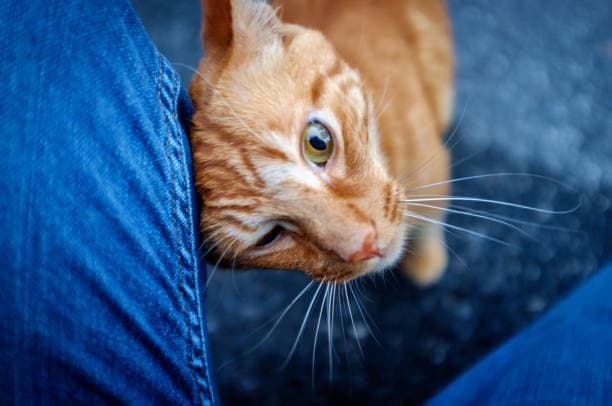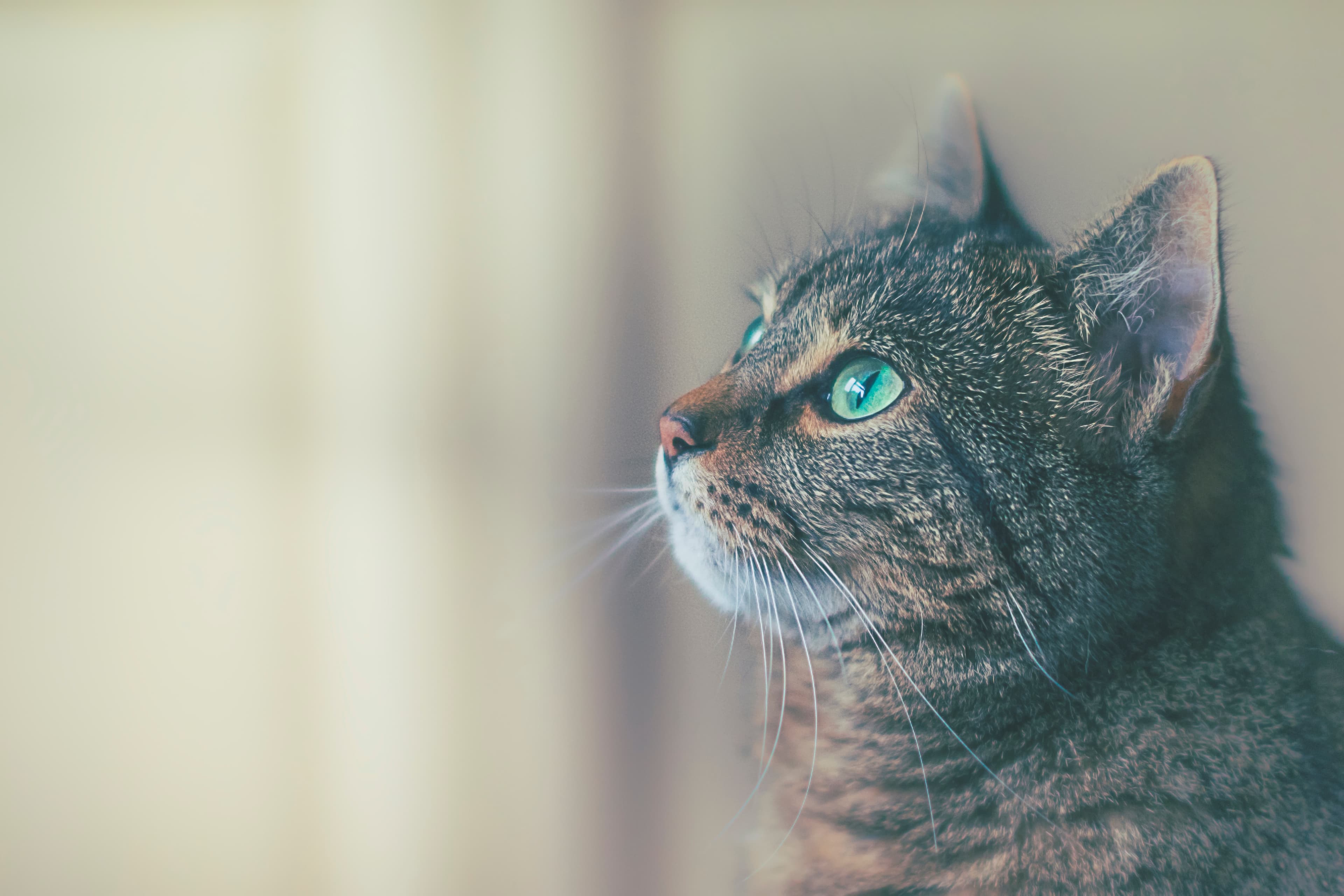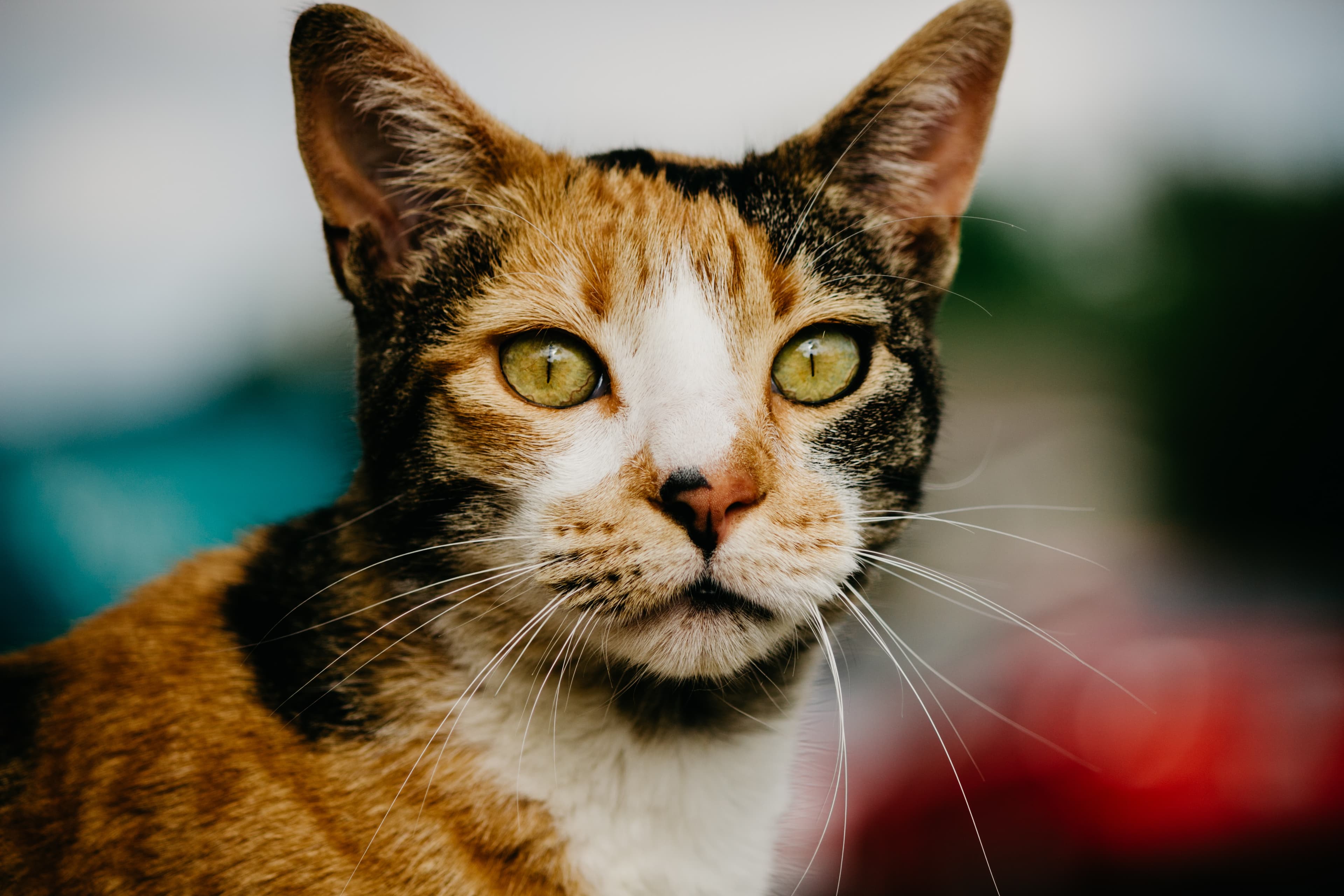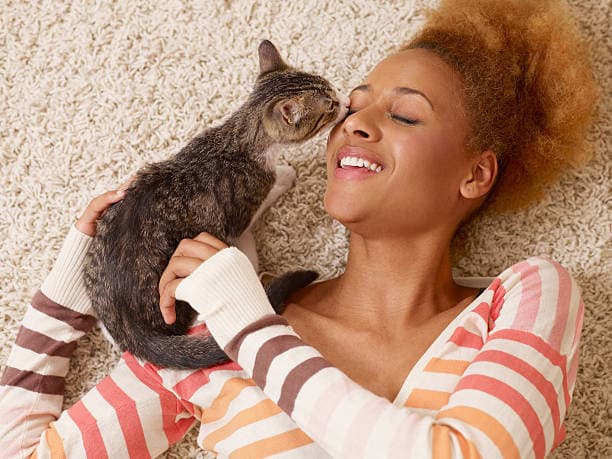Understanding Why Cats Rub Against People and Objects
Cats indulge in many affectionate and playful behaviors that fascinate their humans. One such behavior is rubbing themselves against furniture items and their owners’ legs or bodies. This behavior is adorable. It makes cats charming and mysterious, and adds to their allure as companion pets.
The reason why cats rub themselves against people and furniture is because they want to mark their territory. Cats have pheromones or scent glands on their faces and under their tails. By rubbing themselves, they leave their scent on objects or people to let other cats or pets know that these belong to them.
The Science Behind Cat Rubbing Behavior: Detailed Explanation
Why do cats rub against you? To answer this question, let us first understand feline pheromones.
Animals release pheromones to signal to other animals in the vicinity about their territory, reproductive status, etc. Feline pheromones consist of powerful scents or odors that signal to recipients about the cat’s presence and territory boundaries. A cat releases these scents or pheromones from various cat scent glands present on their cheeks, chin, head, and base of the tail.
By rubbing and scratching against people or objects, cats communicate to others of their own species that they have been in this place and possibly how recently they were there. They also want to convey to their owners that they belong to them!
The Many Reasons Why Cats Rub Against You
What does it mean when a cat rubs against you? There are several reasons for this kind of cat behavior.
Greeting You or Saying Hello
You might notice that your cat rubs against you when you come back home from work in the evening. It is your pet’s affectionate way of saying hello or greeting you after a long absence. By head-bunting or bumping you, your cat is marking you with their scent. This behavior has a friendly intention and is a feline way of showing love and affection.
Cats also say hello to their owners in other ways, such as with a soft meow or purr. Your pet will have a relaxed body posture, and their tail may be held high or it may be slightly curled. Mainly, they rub against you to say, “You are mine!”

Marking You As a Part of Their Territory
Cats communicate trust and affection and also convey “ownership” by rubbing their bodies or faces against you. A cat “rubbing against leg” action helps them reapply their scent on you. This shared scent creates a bond of love and trust between the cat and the owner.
It is estimated that cats release different pheromones when they rub against furniture and owners. While rubbing against furniture or objects signifies territory marking, rubbing on humans indicates social bonding and affection.
Seeking Attention or Interaction
Cats sometimes rub against you because they may be seeking food, attention, or playtime with you. However, when your cat wants something from you, they may be more vocal. They might also let out a mid-pitched or high-pitched meow. Additionally, your cat might paw you constantly or follow you around. This can help you differentiate between affectionate rubbing and attention-seeking rubbing. If your cat wants to play, they may bring a toy over to you.
As a pet owner, avoid misinterpreting rubbing as an invitation for petting. At the same time, do not scold or push them away, as that may make them feel rejected. Allow your pet to rub against you to strengthen your loving bond.
Gathering Information About You
Your cat may rub against you after you come back from outside. They may sniff your body to find out where you went or whether you petted another cat or dog! Your cat is collecting scent-based intelligence.
Sometimes, your cat may rub against a visitor or a “new person” they have never met to gather information about them. It could be your cat’s friendly way of greeting them and saying hello, or simply checking them out.
There is a difference between a cat rubbing against you for information and rubbing for bonding. If your cat rubs against strangers, they may not necessarily be fully comfortable with them yet. They may simply be curious about them and wish to gather information.

Forming a Social Group Scent
According to the MSD Veterinary Manual, cats are social animals. In feral colonies, they live in groups. A cat that is used to living in a group might look at you, the owner, as a part of their social group. Rubbing against you is their way of showing that they consider you a part of their colony. This is also why feral cats and cats living together in a house may rub against each other and their owners. This helps them with “communal scent marking” and establishes group harmony.
When Rubbing Is Linked to Mating Behavior
Sometimes, feline rubbing behavior can be attributed to mating behavior. An unspayed female cat might rub against objects or their owners during their heat cycle.
A male cat might also rub excessively to signify interest in mating with a female cat nearby. This rubbing behavior in unneutered cats is more pronounced due to their heightened hormones. During this phase, they may even cry, meow, or vocalize all the time. Some female cats present their rears to show they are ready to mate.
It is best to get your cat spayed/neutered as advised by your vet. Doing so can prevent many unwanted behavioral issues.
When to Be Concerned About Excessive Rubbing
Signs That Rubbing Might Indicate a Medical Issue
If your cat is rubbing against you more than usual, do observe them for health issues. Excessive and frantic rubbing could signify underlying medical problems. Your cat could be in pain due to an illness or injury. They could even be stressed or anxious due to some environmental changes.
Is your cat also itching or scratching excessively? Have they shown any appetite changes or weight loss? If you observe these signs, please take your cat to the vet right away.
Common Health Conditions That Can Cause Rubbing Behavior
Allergies: excessive and frantic rubbing could be triggered by allergies. Cats are known to be allergic to dust, household cleaners, certain foods, and flea saliva.
Ear infections: if your cat is also shaking their head while rubbing it on objects or your legs, they could have an ear infection or trauma. Examine your pet’s ears for foul odor or discharge. If you notice these signs, please get them seen by the vet right away.
Feline hypersensitivity disorder: this is a feline medical condition triggered by allergies, neurological issues, or environmental stress. It can result in excessive or obsessive-compulsive behaviors like rubbing. Your vet will take a detailed medical history to determine the root cause and start the treatment accordingly.
Skin problems: skin irritation, infections, or wounds could also cause your cat to rub excessively. This is mainly because your cat tries to alleviate their pain or discomfort by rubbing and scratching. Take your pet to the vet to start the right treatment.
Dental problems: sometimes, you might wonder, “Why do cats rub their face on you?” Excessive facial rubbing can be a sign of oral issues such as gum disease, periodontal disease, or Feline Orofacial Pain Syndrome (FOPS). These conditions can cause significant pain or discomfort, and rubbing may be your cat’s way of trying to relieve it. Regular dental checkups and at-home oral health tests for cats can help prevent such problems. Watch for other signs like bad breath, pawing at the mouth, and excessive drooling. If you notice any of these symptoms, consult your veterinarian immediately.
Why Some Cats Rub and Then Bite You
Overstimulation and Play Aggression
Sometimes, a cat may rub against their owner but may get ‘overstimulated’ if petted. Overstimulation could make cats aggressive, including behaviors like biting or scratching. This can stem from cats’ natural predatory instincts. Your cat does not mean any harm; they certainly don’t want to hurt you.
In some cases, cats may turn from rubbing to pouncing, biting, and swatting. It could be because the owner may have petted them in some sensitive area. Such behavior is also seen in cats that have not been given enough play opportunities since early age.
To avoid scratches and bites, learn to read your cat’s body language. If they appear overexcited or overstimulated, please stop the play. Signs of overexcitement include aggressive tail movements, ears flattened against the head, dilated pupils, excess swatting, stalking movements, etc.
Redirected Hunting Instincts
According to experts, cats are natural-born predators. Even after mankind started domesticating cats, they were still killing rodents and pests for humans. It is no wonder that even well-fed indoor cats need to hunt from time to time.
This natural feline predatory instinct could sometimes get redirected towards humans. A cat may view their humans as “stand-in prey.” Without adequate mental stimulation through toys, puzzle feeders, and games, cats tend to get bored, and this boredom could turn into aggression. They may unknowingly direct this aggression towards their humans.
To prevent this redirected hunting instinct, provide prey alternatives like laser toys, feather bell toys, toys with tassels, etc.
How to Respond to Cat Rubbing Behavior
When to Respond with Petting or Affection
Your cat may want you to pet them when they show their belly, rub against you, or purr gently. They may also show affection through bunting or headbutting. Your cat may follow you around or even sleep on you! Their body language will be relaxed—a relaxed or upright tail, slow-blinking, or wrapping their tail around you.
Cats are sensitive creatures and tend to get overstimulated through petting. So, do not pet your cat too much; if they continue rubbing against you, offer them food or play with them.
When to Ignore or Redirect Rubbing Behavior
Your cat may rub against you just before mealtime or when they want to play with you. In such a case, the rubbing is not for affection but simply for attention. So, pay attention to the timing. Consider your cat’s body language as well. If they are vocalizing or mewing alongside rubbing, or if there have been some recent changes in their environment, they may simply be looking for reassurance.
Here are some cat training tips to prevent excessive rubbing when seeking food:
Ignore the behavior when it is right before mealtime.
Establish strict meal times for your cat.
Only reward and pet your cat when they are calm and relaxed.
Use a firm “no” if the rubbing becomes too insistent or needy.
Enriching Your Cat’s Environment to Reduce Excessive Rubbing
Providing Safe Spaces and Comfort Areas
Provide your cat with plenty of climbing spots, perches, and cozy beds. These additions create a safe environment for them to hide and relax, which can minimize stress-related rubbing behavior. Wall-mounted perches and cat trees offer both physical and mental stimulation for indoor cats, who may be more inclined to lead a lazy, sedentary life.
Using Pheromone Diffusers
Pheromone diffusers create a calm space as they mimic natural, calming feline pheromones that promote positive behaviors. They also reduce anxiety and stress-driven rubbing in agitated cats. Calming pheromones are especially beneficial in multi-cat households as they reduce conflict and tension between the cats.
Engaging in Regular Playtime and Exercise
Through interactive play, you can reduce several behavioral issues that are known to pop up in sedentary or inactive cats. Interactive play provides much-needed mental and physical stimulation, which, in turn, could prevent boredom-related rubbing in your furry pal. In addition to helping your cat maintain a healthy body weight and agility, interactive play also keeps your cat’s mind sharp.
The best toys to redirect rubbing into healthy play habits include interactive wand toys, feather toys, and laser pointer toys as they mimic prey. These toys engage your cat’s hunting instincts and promote physical activity. They also entice your cat to pounce and leap—just like a prey does in the wild.
Creating a Predictable Routine
According to experts, cats thrive on set routines. Cats are creatures of habit, and any changes in their mealtime and other schedules can stress them out. Stress and anxiety could trigger rubbing behavior in cats. So do maintain strict meal times and play schedules. This helps improve your cat’s confidence, and your pet also won’t have to resort to rubbing against you for demanding food or attention.
Final Thoughts: Understanding Your Cat’s Unique Behavior
If you have been wondering, “Why do cats rub against you?” we hope this guide has helped you get the answer. Cats rub against their owners to mark them with their pheromones from their cat scent glands. It helps them mark their territory and also show their love for the owners. In some cases, excessive rubbing could stem from an underlying disease, stress, or unmet needs.
Frequently Asked Questions
How does my cat rub face against mine?
It's a way for cats to mark their scent on you and show affection. They may also be trying to gather information about your scent through touch.
Why do cats like it when you rub the side of their face?
Cats have scent glands on their cheeks, and rubbing serves as a way to release pheromones and feel good. Rubbing also helps cats gather information about objects through touch.
Why do cats rub their face and teeth on you?
This behavior is often seen in cats who are marking their territory and showing affection. It's also a way for them to spread their scent and gather information about your scent through touch. Overall, it's a natural way for cats to express themselves and bond with their human caregivers.
My cat keeps meowing and rubbing against everything. Is it okay?
If your cat is excessively meowing and rubbing against objects, it could be a sign of stress, discomfort, or underlying health issues. It's best to consult with a veterinarian for an evaluation to determine the cause and provide appropriate treatment.







